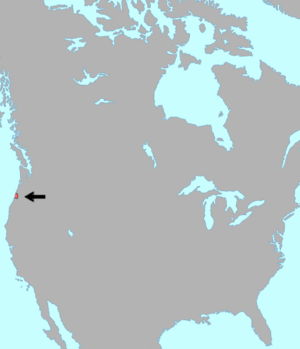Alsea language facts for kids
Quick facts for kids Alsea |
||||
|---|---|---|---|---|
| Alsea-Yaquina / Yakonan | ||||
| Pronunciation | /ˈælsiː/ | |||
| Region | Oregon | |||
| Ethnicity | Alsea people, Yaquina people | |||
| Extinct | 1942, with the death of John Albert | |||
| Language family |
Coast Oregon Penutian?
|
|||
| Dialects |
Alsea
Yaquina
|
|||

Pre-contact distribution of Alsean
|
||||
|
||||
Alsea (also called Yakonan) was a language spoken by Native American people along the central coast of Oregon. It was actually made up of two very similar ways of speaking, sometimes called Alsea and Yaquina. Sadly, both of these language varieties are now extinct, meaning no one speaks them anymore. The last known speaker of Alsea passed away in 1942.
Contents
What Were the Alsea Language Varieties?
The Alsea language had two main forms:
- Alsea (also known as Alséya)
- Yaquina (also known as Yakwina or Yakona)
Both of these language varieties are now extinct. This means that no one speaks them as their native language anymore.
Where Did the Names Come From?
The name Alsea came from the Coosan people, who called them alsí or alsí·. Another group, the Marys River Kalapuyan people, called them alsí·ya. The last time someone recorded the Alsea language was in 1942. This was done by a researcher named J. P. Harrington, who spoke with the last speaker, John Albert.
The name Yaquina came from the Alsean people themselves. They used the word yuqú·na to describe the area around Yaquina Bay and the Yaquina River. The Yaquina language was last recorded much earlier, in 1884, by James Owen Dorsey.
How Was Alsea Related to Other Languages?
Alsea is usually thought to be part of a larger group of languages called Penutian. It might also be part of a smaller group called Coast Oregon Penutian, along with languages like Siuslaw and the Coosan languages.
However, some words in Alsea are very similar to words in the Northern Wintuan languages. This similarity probably happened because of borrowing (when languages share words) about 1,500 years ago. At that time, the Wintuan people might have lived closer to the Alsea people in Oregon.
Sounds of the Alsea Language
Like all languages, Alsea had its own unique sounds. It had many different consonants and vowels that made it sound special.
Consonant Sounds
The Alsea language had 34 different consonant sounds. Some of these sounds were made by stopping the air completely, like the 'p' sound. Others were made by pushing air through a narrow space, like the 's' sound. There were also sounds that were "ejective," meaning they were made with a burst of air from the throat.
Vowel Sounds
Alsea had three main vowel sounds:
- The 'a' sound, like in "father"
- The 'i' sound, like in "machine"
- The 'u' sound, like in "flute"
Sometimes, these 'i' and 'u' sounds could be longer, like the 'e' in "they" or the 'o' in "go." The language also had a special "mid" vowel sound that was often added in between other sounds.
hr:Alsea jezik
 | Jewel Prestage |
 | Ella Baker |
 | Fannie Lou Hamer |

